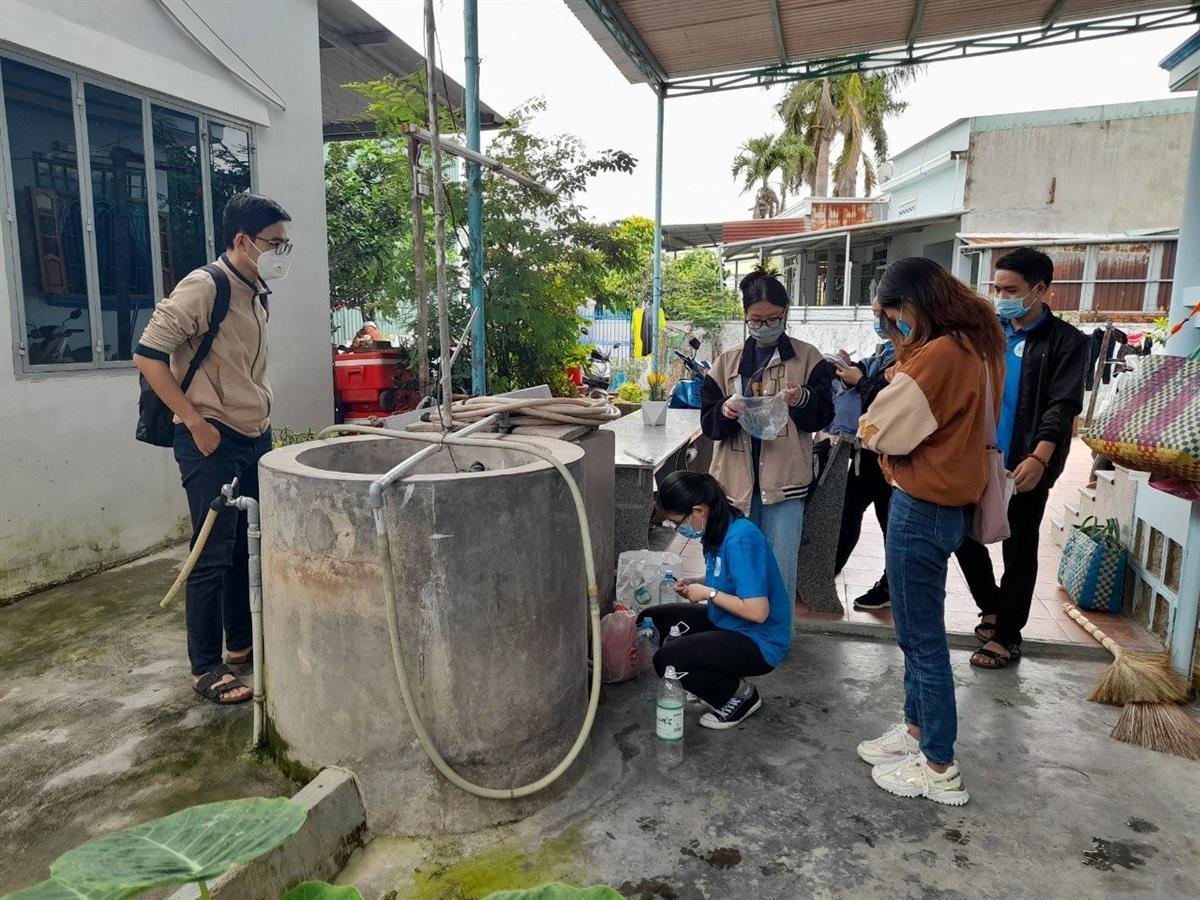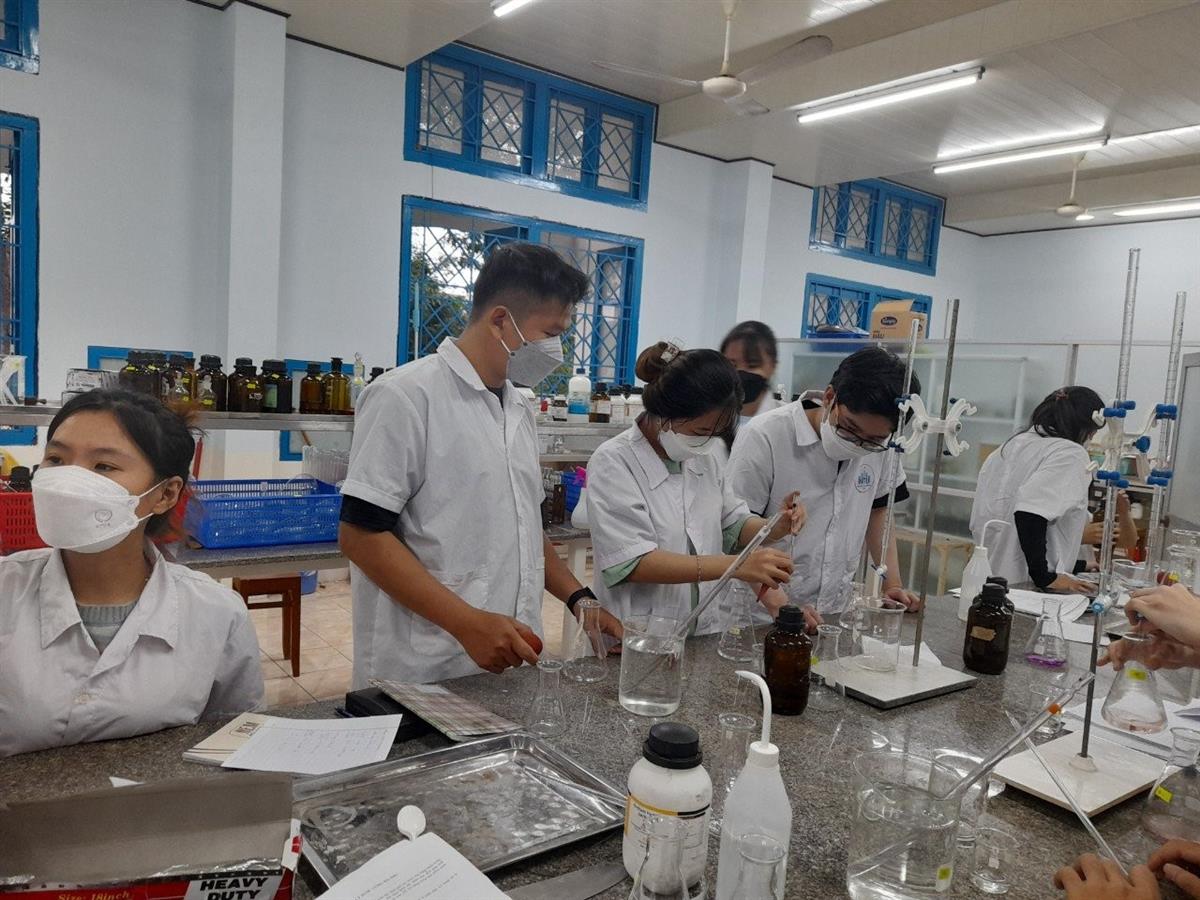From the implementation of scientific research projects funded by the school, many scientific research results of students have been accepted and reported at national conferences and seminars such as: Industry conferences. National Biotechnology, National Mycology Conference, National Young Fisheries Science Conference; Workshop on coastal environment protection and management. It is expected that the Institute will have 6 scientific research topics expected to attend the Scientific Research Student Conference of Nha Trang University in the academic year 2022 - 2023.
In addition to essential research topics, a number of student projects are practical and applicable. Specifically, the topic "Survey on groundwater use and pollution in some suburban areas of Nha Trang city" was carried out by a group of students from the 60th and 62nd class in Environmental Engineering from having directly surveyed 360 households and taken groundwater samples for analysis in 3 communes outside Nha Trang, including Vinh Thanh, Vinh Ngoc, Vinh Hiep. The survey shows that: All surveyed households exploit groundwater in the surface layer. The pH of groundwater is standard, but the iron concentration is high in the rainy season, nitrate pollution in the dry season, and total hardness is very high. The initial results of the project are also the basis for the management and rational exploitation of underground water resources in the area.

Or the topic of student Le Mai Nha - 61CNSH research on Vibrio parahaemolytic bacteria carrying the toxic gene pirAB causing AHPND acute hepatopancreatic necrosis disease in shrimp, this disease is being considered a great threat to industrial shrimp farming in Southeast Asia in general and Vietnam in particular. The study also determined the antibiotic resistance of these bacteria strains, thereby giving recommendations on the use of antibiotics for shrimp farming households in Khanh Hoa province. Following the above research results, student Le Xuan Phong - K62.CNSH has selected actinomycetes that are resistant to Vibrio parahaemolyticus strains containing the toxin gene pirABvp. Research results on the topic have potential applications as probiotics to prevent hepatopancreatic disease for shrimp.
The project of student Huynh Thi Ngoc Anh - K61.CNSH has built a data set on the formation and development of the cochlear bone of Amphiprion frenatus. This is an important material for teaching and practice. At the same time, this data is significant in estimating fish growth rates, and determining the age, distribution, and population structure of the wild bream, as well as other reef fish in early development.
To get those bright spots, the Institute of Biotechnology and Environment has carried out many activities to promote the scientific research movement among students. In the curriculum, the Science Research Methodology subject helps students approach scientific research. This subject is designed to work in groups and research topics proposed by students, from which to apply the learned knowledge to be able to find information to support research ideas, develop research content, and research planning. The explanation of the student scientific research topic is one of the products students need to complete to meet the output standards of the subject.
Every year, the Student Club of the Institute organizes short courses on skills of writing explanations of scientific research topics: from here students will have the opportunity to put their ideas into proposals, and teachers will guide the main steps to develop into a complete proposal. Other short-term courses are also implemented to provide students with basic knowledge and skills to facilitate the process of writing scientific reports, such as a course on statistical processing, graphing, and part instruction. The software cites references (Mendeley, Endnote) based on the students' empirical research data. In addition, when students submit a proposal to the Institute, teachers will comment on many levels such as from the Department level to the Institute level so that they can best complete the explanation before submitting it to the School level for approval.
The advisors regularly introduce to students the research groups and research directions of the teachers in the Institute, and at the same time encourage them to go to the laboratory to practice and improve their practical skills, helping them to improve their practical skills and understand more about practical work in the laboratory besides the theory they have learned in class. In addition, the Institute of Biotechnology and Environment also regularly organizes academic activities to share research results of groups and share experiences of domestic and foreign experts, to help them light the fire. passion for scientific research.

In addition, students are also connected to participate with lecturers as collaborators or interns in environmental projects such as: Mangrove Conservation (2023), GYL22 (2023), Zero Waste (Phu Yen-2022), Marine Plastic Waste Monitoring (2019-2021), Compose (2019). Diverse activities with many different units and goals give students the opportunity to learn and accumulate more skills to be more confident when planning and implementing their own scientific research projects.
Students themselves, when conducting scientific research, also face many difficulties, especially in allocating reasonable time to do experiments when the practice and theory class schedule is closed for the whole week. Therefore, students cannot arrange the time to do experiments during the week, while some machines limit the use of weekends. On the other hand, some machinery and equipment are still missing or damaged but have not been repaired in time, not meeting the current research situation. Another significant difficulty for science research students is that too many steps of initial application procedures and advance payment procedures make it difficult to carry out the project on schedule; At the same time, the financial settlement of the topic is quite lengthy (even after acceptance) causing financial difficulties for students.
To help students overcome difficulties, the teachers in the Institute always accompany students from the step of supporting them in initial activities such as completing ideas, designing experiments, planning and conducting experiments and step-by-step carrying out their research activities, assisting with financial formalities and helping them contact specialized equipment. The teachers often inquired to understand the difficulties and encourage, together solve problems for students during the experiment, sometimes even advance money for students to buy chemicals for experiments in advance to keep up with the progress of the topic. At the same time, teachers share new information about research, and scientific conferences related to the topic so that students can participate and learn more.